|
|
|
Sort Order |
|
|
|
Items / Page
|
|
|
|
|
|
|
| Srl | Item |
| 1 |
ID:
138700
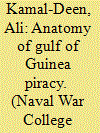

|
|
|
|
|
| Summary/Abstract |
As a global response to piracy off the coast of Somalia was taking place, alarm bells were ringing about a similar growing insecurity in the Gulf of Guinea. Today, the Gulf of Guinea stands as the most dangerous maritime area in terms of the success rate of attacks and violence. The United Nations Security Council adopted Resolutions 2018 (in 2011) and 2039 (in 2012) expressing grave concern about the mounting insecurity in the region and its consequences for regional and global security. A United Nations (UN) team was deployed to the region to assess the situation.
2
|
|
|
|
|
|
|
|
|
|
|
|
|
|
|
|
| 2 |
ID:
181707


|
|
|
|
|
| Summary/Abstract |
As a landlocked country, Afghanistan has been given special privileges by the United Nations Convention on the Law of the Sea (UNCLOS) to access seaports through transit states. Pakistan, as a transit state to Afghanistan, has violated such provisions of international treaties on many counts by blocking transit routes for trade with India and by denying access to its Karachi Port. India’s Chabahar Port project in Iran acts as an alternative for Afghanistan to trade and aims to reduce its vulnerability of being dependent on Pakistan. This article attempts to highlight the India–Iran–Afghanistan trilateral understanding in Chabahar as an example of multilateral cooperation in fulfilling commitments made to international regimes, such as the UNCLOS, while bringing out the geopolitical challenges that India faces to complete the Chabahar project. In this context, the aim is to study the applicability of UNCLOS for rights of landlocked states and the importance of the Chabahar Port in protecting Afghanistan’s commercial freedom. The article also highlights India’s role in the region as it is responsible for implementing the Chabahar Port project.
|
|
|
|
|
|
|
|
|
|
|
|
|
|
|
|
| 3 |
ID:
101595


|
|
|
|
|
| Publication |
2010.
|
| Summary/Abstract |
Article 121(3) of the United Nations Convention on the Law of the Sea states that "Rocks which cannot sustain human habitation or economic life of their own shall have no exclusive economic zone or continental shelf." If any of the geographical features situated in the Pacific Ocean are considered "rocks" that fail the tests of habitation or economic viability, they will not be entitled to their own 200 nautical mile exclusive economic zone and continental shelf. However, the paragraph and the tests contained in the article give rise to various questions of interpretation, which have become one of the main sources of maritime disputes between the countries concerned. This article examines the interpretation and possible application of Article 121 to five selected insular features that are situated in the Northern, Eastern and Western Pacific Ocean, namely Baker Island, Howland Island, Clipperton Island, Douglas Reef (Okinotorishima) and Marcus Island (Minamitorishima).
|
|
|
|
|
|
|
|
|
|
|
|
|
|
|
|
| 4 |
ID:
115903


|
|
|
|
|
| Publication |
2013.
|
| Summary/Abstract |
The Arctic ice is melting faster than predicted. In August 2012, calculations based on the satellite imagery indicated that the summer sea ice loss was 50 per cent higher than earlier estimates. 1 Scientific evidence now suggests that the Arctic, by the middle of the century, will be ice free in the summer. Scientists call it the 'Arctic amplification'-the reduction in the ice cover not only reduces the reflection of the sunlight but also increases the absorption of heat as the darker water is exposed.
|
|
|
|
|
|
|
|
|
|
|
|
|
|
|
|
| 5 |
ID:
121926
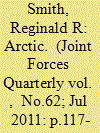

|
|
|
| 6 |
ID:
153272


|
|
|
|
|
| Summary/Abstract |
Many international legal experts believe that the Philippines v. China arbitration award of 12 July 2016 represents a game changer for South China Sea dispute settlements because the award has brought a breathtaking legal clarity to the complex disputes. This article argues that the sweeping nature of the award had a very paradoxical effect on Chinese policy. The arbitration ruling has led to the hardening of China’s claims, but it has also raised a new readiness among Chinese policymakers to renew negotiations. The sweepingness of the award makes it hard for the Philippines to reach a negotiated compromise with China on the basis of the award, but it also presents a surprising political opportunity in regional politics for the major actors involved to lower tensions and recalibrate policies. Although China’s new readiness to negotiate is welcome, the overall impact of the three-and-a-half-year-long arbitration is likely to create a deadlock in negotiations in the near future. Paradoxically, this may raise the importance of political and power-centred approaches to regional dispute settlements, as the legal approach embodied by arbitration continues to meet Chinese defiance.
|
|
|
|
|
|
|
|
|
|
|
|
|
|
|
|
| 7 |
ID:
185846
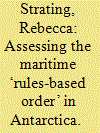

|
|
|
|
|
| Summary/Abstract |
International Relations has become increasingly interested in maritime order as the oceans have emerged as a key site of strategic competition. The South China Sea has become totemic of contests between ‘free’ and ‘closed’ visions of the seas, and is viewed by some as a litmus test for China’s efforts to re-write the ‘rules-based order’ in other maritime domains. This article examines the maritime ‘rules-based order’ in Antarctica, critically examining how and why the United Nations Convention on the Law of the Sea (UNCLOS) matters for the Antarctic region, the Southern Ocean and mechanisms of regional governance. This article contributes to understanding the complexity of maritime order in Antarctica by using Australia’s maritime claims as a case study. Australia is the largest claimant state in Antarctica, with the Australian Antarctic Territory (AAT) constituting 42% of the landmass. This paper examines Australia’s contentious maritime jurisdiction and its ‘normative hedging’ strategy that simultaneously asserts maritime claims and defends collective governance mechanisms, despite the apparent dissonance between these two positions. It argues that the Antarctic region has its own unique ‘rules-based order’ and geographic realities that complicate cross-regional comparisons, and that even so-called ‘like-minded’ states interpret maritime rules in different ways.
|
|
|
|
|
|
|
|
|
|
|
|
|
|
|
|
| 8 |
ID:
118138
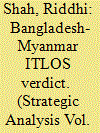

|
|
|
|
|
| Publication |
2013.
|
| Summary/Abstract |
The International Tribunal for the Law of the Sea (ITLOS) is a body set up under the United Nations Convention on the Law of the Sea (UNCLOS) to deal with disputes that emerge because of a difference in the interpretation and application of the convention. 1 Bangladesh has had an ongoing maritime boundary dispute with India and Myanmar since 1974. On 14 March 2012, the ITLOS delivered a verdict and ended the long-running maritime boundary dispute between Bangladesh and Myanmar.
In the current global world, energy resources are a crucial element for a nation's growth. India, Bangladesh and Myanmar are no different in this regard. India discovered 100 trillion cubic feet (tcf) of gas reserve in the Bay of Bengal (BoB) in 2005-2006. Soon after, Myanmar discovered seven tcf of gas reserves near the Rakhine coast. This discovery of colossal gas reserves sparked a claim-staking contest between the three countries in the BoB.
|
|
|
|
|
|
|
|
|
|
|
|
|
|
|
|
| 9 |
ID:
162735
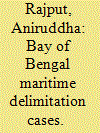

|
|
|
|
|
| Summary/Abstract |
At a time when there are instances of lack of participation in binding dispute resolution mechanisms under the UNCLOS, the Bay of Bengal Arbitrations provide a ray of hope and adherence to the rule of law. The three Bay of Bengal States: Bangladesh, India and Myanmar settled their long standing disputed claims over the maritime zones in the Bay of Bengal in a peaceful manner. These cases represent that States relatively stronger on the political level as compared to others are willing to compromise their positions and adhere to the outcome of dispute resolution proceedings under the UNCLOS. These cases involved sensitive issues such as the determination of the land boundary terminus, based upon the reports and other proceedings relating to the partition of India. There were other controversial claims over certain islands, which too were presented for adjudication and the decision was thereafter complied with all the parties to the dispute. These cases thus constitute a prime example of the importance of adherence to a rule based system for maritime claims.
|
|
|
|
|
|
|
|
|
|
|
|
|
|
|
|
| 10 |
ID:
180242
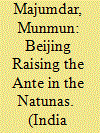

|
|
|
|
|
| Summary/Abstract |
China’s nine-dash line or U-shape line claim in the South China Sea overlaps with Indonesia’s 200 nautical miles exclusive economic zone (EEZ). There have been several instances where Jakarta and China have entered into skirmishes involving fishing vessels in the Natuna area. The latest encroachment by China into Indonesian Natuna EEZ witnessed a departure of China’s justification for such action when it argued that it has sovereignty over the Nansha (Spratly) Islands and also sovereign rights over relevant waters near the Nansha Islands. Jakarta rejected both the arguments and insisted that under United Nations Convention for the Law of the Sea (UNCLOS) China does not have legal basis to claim either traditional fishing grounds or parts of the Natuna waters and invoked the 2016 UN Arbitral Tribunal’s ruling to back its position. This article examines Indonesia’s response vis-à-vis China and argues that with the rise of nationalism over ownership of the Natunas it is likely to progress into an area of potential conflict between Indonesia and China.
|
|
|
|
|
|
|
|
|
|
|
|
|
|
|
|
| 11 |
ID:
163443


|
|
|
|
|
| Summary/Abstract |
The ICJ’s judgment on preliminary objections in Somalia v. Kenya touched new ground by ruling on such key provisions of UNCLOS as Articles 282 and 287. Its implications may go well beyond the present case. The Court ruled that the acceptance of its jurisdiction arising under Article 282 prevails over the selection of a preferred tribunal under Article 287 by election or by default. Some thought needs to be given to the manner in which the Court interpreted Articles 282 and 287. Instead of using the travaux préparatoires as a supplementary means to confirm the meaning resulting from the application of the general rule in Article 31 of the VCLT, the Court seemed to base the core of its interpretation on the travaux préparatoires. The Court’s interpretation of the relationship between Articles 282 and 287 in effect accords pride of place to itself. On a practical front, some States Parties of UNCLOS which have made optional clause declarations with reservations of various types may have to ponder what this Judgment means for them in the case of maritime delimitation disputes. Those States Parties which have not chosen the Court as its preferred forum or given it any prominence under Art. 287(1) will see their express choices of means of dispute settlement to be under a cloud, in light of the Court’s interpretation of Art. 282 in the present case.
|
|
|
|
|
|
|
|
|
|
|
|
|
|
|
|
| 12 |
ID:
151365
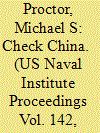

|
|
|
|
|
| Summary/Abstract |
The People’s Republic of China (PRC) recently suffered a serious embarrassment in front of an international arbitral tribunal convened under authority of the U.N. Convention on the Law of the Sea (UNCLOS). The Permanent Court of Arbitration dismissed decades-old PRC claims to sovereignty over a large swath of the South China Sea. The PRC, however, rejected the tribunal’s decision and appears ready to carry out some sort of escalation to demonstrate that it maintains sovereignty.
|
|
|
|
|
|
|
|
|
|
|
|
|
|
|
|
| 13 |
ID:
140405
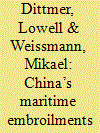

|
|
|
|
|
| Summary/Abstract |
CHINA’S MARITIME PERIPHERY OR ‘‘NEAR SEAS—the Yellow Sea, the East China Sea, and the South China Sea—are waters through which a great deal of vital commerce flows, as China, Japan, Korea, and numerous Southeast Asian countries are all major trading nations that import the energy and raw materials that sustain their thriving economies. Since 2009 the East and South China Seas have become increasingly fraught with tension. This has generally been attributed to rising Chinese assertiveness, but not because China has started making a lot of assertions it never made before. As the authors assembled here point out in replete detail, China’s explicit claims to the Diaoyu/Senkaku islets in the East China Sea date back at least to 1971, while it can trace its claim in the South China Sea back to the publication of the famous ‘‘nine-dashed line’’ map by the Nationalists in 1947 (at the time it contained eleven segmented lines; the victorious Communists subsequently dropped two).
|
|
|
|
|
|
|
|
|
|
|
|
|
|
|
|
| 14 |
ID:
137770
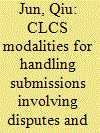

|
|
|
|
|
| Summary/Abstract |
This article reviews the disputed claims submitted to the Commission on the Limits of the Continental Shelf (CLCS) by coastal States and the corresponding actions taken by the Commission to deal with these disputes. Although the Commission has set up its modalities of handling the submission of related disputes, and despite that its decisions have successfully balanced the interests of the States concerned, it might not be capable of handling disputes of a more complicated nature. An example of a complicated dispute is the submissions involving the region of the South China Sea which contain land territory sovereignty disputes, maritime boundary delimitation disputes, as well as disputes in regards to the interpretation and application of the UNCLOS. Compared with most other submissions, the disputes associated with the South China Sea are obviously more complex. We, therefore, conclude that it is more appropriate for the Commission to not consider or qualify these submissions, rather than to defer their consideration.
|
|
|
|
|
|
|
|
|
|
|
|
|
|
|
|
| 15 |
ID:
144485
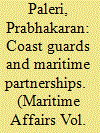

|
|
|
|
|
| Summary/Abstract |
Coast guards are unique forces with global potential. The first coast guard was created nearly four centuries ago in Europe, but countries are still unable to make the most of these forces even in the post-UNCLOS (United Nations Convention on the Law of the Sea) world. This paper underscores their strategic role and argues that the coast guards can accentuate their value in the geostrategic context by establishing maritime partnerships. Engaging the coast guards in maritime partnerships can also lead to combined and enhanced responsibility towards the global commons at sea.
|
|
|
|
|
|
|
|
|
|
|
|
|
|
|
|
| 16 |
ID:
102577


|
|
|
|
|
| Publication |
2011.
|
| Summary/Abstract |
This article addresses how the CLCS can curb the situations prohibited by Article 137(1) of UNCLOS, i.e. encroachment upon the Area. The CLCS is mandated by Article 76 to consider the submitted information that coastal States intend to use in establishing limits of outer continental shelves. When the inconsistency of the Submission with Article 76 is mishandled by the CLCS, encroachment may materialize. Being critical of the CLCS's decisions as to when to disqualify a controversial Submission, the scope of disputes under the CLCS Rules of Procedure has been unreasonably narrowed by practice and rendered inconsistent with Article 76(1). Consequently, encroachment is not discouraged. The author argues that a proper interpretation and application of Article 76(1) by the CLCS, while taking Article 121 as context, may prevent such an encroachment.
|
|
|
|
|
|
|
|
|
|
|
|
|
|
|
|
| 17 |
ID:
148395
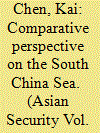

|
|
|
|
|
| Summary/Abstract |
The Asia-Pacific region, even the world, is increasingly focusing on the South China Sea, which is not only one of the most important waterways in the world but also a hot spot of competing claims to territorial sovereignty. The disputes in this region are not new. They can be categorized into two groups: the first concerning territorial sovereignty over islands or reefs, and the second the overlapping exclusive economic zones and continental shelf claims. Historically, the claimants follow the 1982 United Nations Convention on the Law of the Sea (UNCLOS).
|
|
|
|
|
|
|
|
|
|
|
|
|
|
|
|
| 18 |
ID:
138027


|
|
|
| 19 |
ID:
181403


|
|
|
|
|
| Summary/Abstract |
The COVID-19 pandemic has exposed additional weaknesses of the already troubling “flag of convenience” practices under international law; the passenger cruise industry was especially impacted. Most cruise ships under distress from the pandemic received little aid from their flag states, and many vessels were denied entry into ports of nonflag states (regardless of whether an outbreak had been documented onboard). States and vessels lacked clear guidance around their rights and responsibilities under the extraordinary circumstances, resulting in a less efficient response to a dangerous situation. This article reviews the current status of international law concerning port and flag state duties to distressed vessels, and suggests the creation of flag state medical liability to help clarify decision-making during future health crises.
|
|
|
|
|
|
|
|
|
|
|
|
|
|
|
|
| 20 |
ID:
114770
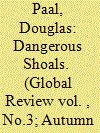

|
|
|
|
|
|
|
|